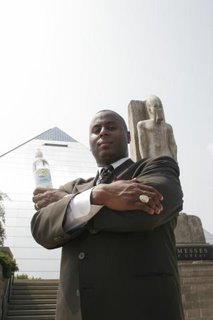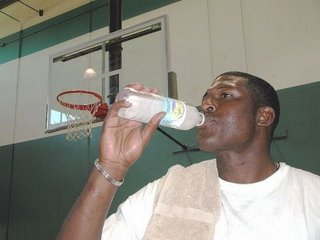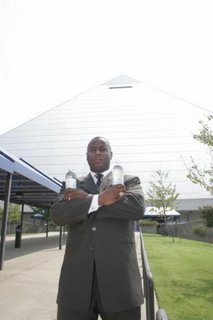By Byron Lee
 At this time of the year, we usually get thoughts from everyday people regarding holiday plans. This time, however, we thought it would be good to spotlight those who have a bit more on their plate (those who give to others, those who have turned their life around, and those who are in a transition in life) in order to provide inspiration for others.
At this time of the year, we usually get thoughts from everyday people regarding holiday plans. This time, however, we thought it would be good to spotlight those who have a bit more on their plate (those who give to others, those who have turned their life around, and those who are in a transition in life) in order to provide inspiration for others. Callie Herd is a blessed woman who believes in maximizing the quality of life. In speaking, the FedEx Information Technology Specialist repeatedly says that life is more than living "3 scores and 10" (70 years). She was inspired by the example of her World War II veteran father ("Even though he went through a lot of racism and prejudice, he still had that smiling face") and the mother who tirelessly took care of said father (along with Herd's five siblings) when he came back from the war severely disabled.
Callie Herd is a blessed woman who believes in maximizing the quality of life. In speaking, the FedEx Information Technology Specialist repeatedly says that life is more than living "3 scores and 10" (70 years). She was inspired by the example of her World War II veteran father ("Even though he went through a lot of racism and prejudice, he still had that smiling face") and the mother who tirelessly took care of said father (along with Herd's five siblings) when he came back from the war severely disabled. Her inspiration led her to get actively involved in community service, first through the Memphis Civil Rights Museum (there was a vast need for volunteers in the wake of author Alex Haley's death in 1992) and then through work with the Memphis Food Bank, where her citywide "Hunger Hurts" activities led to an exponential rise in the number of volunteers for the charity.
Her inspiration led her to get actively involved in community service, first through the Memphis Civil Rights Museum (there was a vast need for volunteers in the wake of author Alex Haley's death in 1992) and then through work with the Memphis Food Bank, where her citywide "Hunger Hurts" activities led to an exponential rise in the number of volunteers for the charity.The 2-time FedEx Volunteer of the Year eventually decided to turn her attention to the plight of single parents trying to find scholarship money for their children after she was able to obtain 1 million dollars in scholarships and offers for her own children. "It would not be right for me not to share this information," says Herd, "I am my brother's keeper." Her efforts resulted in the blog http://www.ctherd.blogspot.com, a blog that has become so well known that it has been mentioned by syndicated writer Stanley Crouch, added to the blog roll of many national websites, and voted as a finalist for "Best Site for Single Parents" by Black Web Awards.
The busy Herd views Christmas as not only a time to relax, but as a time to reflect. "My father passed in August. We usually had Christmas dinner at his house. We're still going to have dinner at his house, and reminisce about the people we have lost and be thankful that we are blessed to still be here."
As for the future, Herd believes that volunteering may provide a silver lining in the overcast skies brought on by the recent Michigan State decision that has gradually scaled back the use of race-based scholarship awards. "[The children] will be looking for volunteer hours, but they will find hope and peace in helping that elderly person who doesn't have someone to read for them, or waiting with that person as they wait for someone to feed them. Our children will learn what it means to give back to their community, and, when they get into college, they can say, 'I'm not a quota, I'm a person, and I got in here because I was just as good as everyone else.'"
Like Ms. Herd, Tedarrell Muhammad also knows the value of giving. The fellow Tennessee native, born to a hard working mother, always had a knack for selling. "I used to cut people's lawns. The housing project I lived in had a lawn cutting service, but they would only cut lawns every three weeks. People in my project wanted their lawns to look clean." His desire to make more money led him to notice the large income his manager at one of his jobs always seemed to pull down. He found out the money came from drug dealing, and he was soon working under his boss.
The fast life came to an end when one of his partners was arrested, and, as a result, Tedarrell was indicted and ended up serving time. While in prison, he made a discovery that changed his life. He heard a recording of a speech made by Minister Louis Farrakhan of the Nation of Islam. "I had never heard anyone speak like that."
 The Nation would continue to play a role in his life once he was released. After being disillusioned with his first post-prison work experience, he worked for a plumbing company ("I used to scuba dive into swimming pools and change their pipes.") One day, he unexpectedly walked into a new occupation: "I changed a pipe, and I thought that it was a sewage pipe. I showed it to my boss, and he said 'People drink out of that.'" His boss also told Tedarrell about Everlasting Spring Water (www.everlastingspring.com) a bottle water company affiliated with the Nation. Tedarrell was skeptical, but he later agreed to learn more about it. He soon started his own branch of the company and, with the help of his wife, Deidre, who holds a MBA, and the assistance of former NBA player Larry Johnson,
The Nation would continue to play a role in his life once he was released. After being disillusioned with his first post-prison work experience, he worked for a plumbing company ("I used to scuba dive into swimming pools and change their pipes.") One day, he unexpectedly walked into a new occupation: "I changed a pipe, and I thought that it was a sewage pipe. I showed it to my boss, and he said 'People drink out of that.'" His boss also told Tedarrell about Everlasting Spring Water (www.everlastingspring.com) a bottle water company affiliated with the Nation. Tedarrell was skeptical, but he later agreed to learn more about it. He soon started his own branch of the company and, with the help of his wife, Deidre, who holds a MBA, and the assistance of former NBA player Larry Johnson, he was able to make it grow to a multi-million dollar operation. He now has warehouses in Memphis, Chicago, and Dallas, and he is looking to soon have plants in Baltimore and California. (He also plans to start distribution here in the St. Louis Area. "I'm looking for people who are willing and able to work to be successful," says Muhammad.)
he was able to make it grow to a multi-million dollar operation. He now has warehouses in Memphis, Chicago, and Dallas, and he is looking to soon have plants in Baltimore and California. (He also plans to start distribution here in the St. Louis Area. "I'm looking for people who are willing and able to work to be successful," says Muhammad.)
Muhammad credits his faith in Islam, especially the tenets of the Honorable Elijah Muhammad, with his success, professionally and personally. "I don't take anything for granted anymore. I realize the power of God. Without him, we are nothing; with him, we are everything. I know that if you work for God, he is duly bound to bless you."
Muhammad also views black entrepreneurship and black support as the keys to the advancement of both the black community and of society as a whole. "We should empower each other and support each other. That is what we are here to do: empower ourselves, our families, our people, and then, the world."
With regard to this holiday season, Muhammad, whose company donated water to a Native American reservation in Louisiana in the aftermath of Hurricane Katrina, says, "We believe in giving all year round. We donate and help people out all year round. I view [the season] mainly as an opportunity to spend time with family."
Andre Anderson also cherishes time with family. Anderson is known for his fashionable wardrobe, his effortless way of making lasting impressions with strangers, and his occasionally ribald sense of humor (which always contains heartfelt advice). Very few people know, however, what this man has been though.
His demeanor had roots in his childhood identity as the class clown. He was always able to draw attention to himself quickly. However, he was soon engaging in drug abuse, which led to criminal activity to feed his habit, which led to incarceration.
At his sentencing, Anderson had a thought that forced him to see the error of his ways. "I thought of my mother being in a casket before I got released. As me and the other guys were getting loaded into the bullpen, I prayed and asked 'Lord, please don't let that happen.'"
From the moment he entered prison, Anderson was a model citizen. The road to making the institution see the method behind his madness was rather difficult: "The facility that I was in did not have anger management or drug rehabilitation programs. I did not want to leave that institution not knowing anything more than I did when I went in, so I wrote grievances to state representatives. I would get a violation and get locked into solitary confinement for 30, 60, 90 days, but I got so many positive responses from the representatives that [the prison staff] had to respect me." Anderson eventually received recognition for doing work to unite prisoners across racial and gang affiliation lines.
Anderson credits his Christian faith for bringing him through his incarceration. "By me realizing that Jesus died in order for me to live, I realized that there was a better way. I started studying and educating myself."
Anderson says that this time of year gives him the opportunity to spend time with his large, loving, extended family. "Even when I was doing wrong, they never turned their back on me. I can't let them know enough how much I appreciate their love." Giving his mother special acknowledgement, he says, "My mother is a women who is strong. When I was chemically dependent, I was not only bringing myself down, I was bringing her down, as well. But when I was out in the streets, she was praying for me. God took all of those prayers and saved me. I give my mother her flowers today, while she's living."
